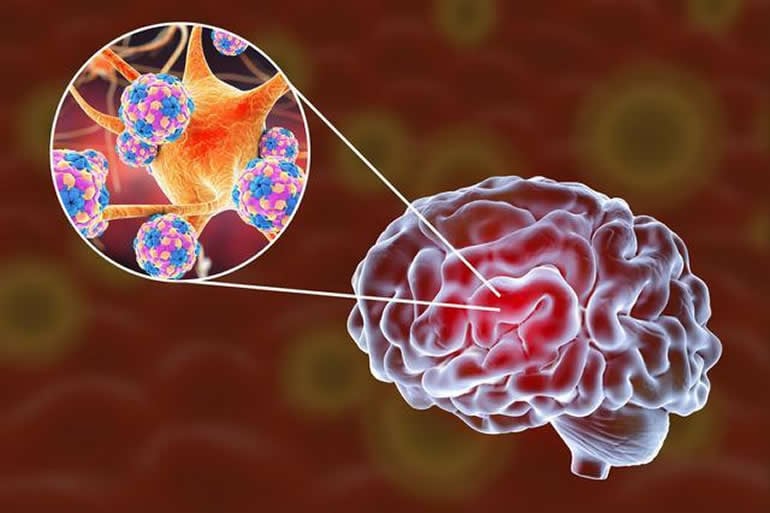Summary: SARS-CoV-2, the virus responsible for COVID-19, can infect human neural progenitor cells and brain organoids. The findings back previous research, finding coronavirus can infect the human brain.
Source: Chinese Academy of Science Headquarters
SARS-CoV-2 can infect human neural progenitor cells and brain organoids, as shown by researchers from the Shenzhen Institutes of Advanced Technology (SIAT) of the Chinese Academy of Sciences and their collaborators from The University of Hong Kong (HKU).
Their study was published in Cell Research on August 4.
Coronavirus disease 2019 (COVID-19) is caused by SARS-CoV-2, also known as the novel severe acute respiratory syndrome coronavirus 2. Over 17 million confirmed cases of COVID-19 and more than 686,703 associated deaths have been reported across 218 countries and geographical regions as of August 3.
This novel coronavirus primarily causes respiratory illness with clinical manifestations largely resembling those of SARS. However, neurological symptoms including headache, anosmia, ageusia, confusion, seizure and encephalopathy have also been frequently reported in COVID-19 patients.
A study of 214 hospitalized COVID-19 patients in Wuhan reported that 36.4% of all patients and 45.5% of severe cases had neurologic symptoms. In addition, studies from France and Germany have revealed that 84.5% and 36.4%, respectively, of COVID-19 patients had viral infections in the brain.
However, there has been no direct experimental evidence of SARS-CoV-2 infection in the human central nervous system (CNS).
To explore the direct involvement of SARS-CoV-2 in the CNS in physiologically relevant models, the research team assessed SARS-CoV-2 infection in human neural progenitor cells (hNPCs), neurospheres and brain organoids derived from induced pluripotent stem cells (iPSCs).
The results demonstrated that iPSC-derived hNPCs were permissive to SARS-CoV-2 infection, but not SARS-CoV infection. Extensive protein expression and infectious viral particles were detected in neurospheres and brain organoids infected with SARS-CoV-2, which suggested SARS-CoV-2 could productively infect the human brain.

Importantly, SARS-CoV-2 infection in 3D human brain organoids was localised to TUJ1 (neuronal marker) – and NESTIN (NPC marker)-positive cells, suggesting SARS-CoV-2 could directly target cortical neurons and NPCs.
“Overall, our study provides the first evidence of direct SARS-CoV-2 infection in human brain organoids, which contributes to our understanding of the pathogenesis of neurological complications in COVID-19,” said Prof. HUANG Jiandong from HKU, who led the study.
The research team suggested that chronic and long-term consequences of SARS-CoV-2 infection of the CNS should be closely monitored.
About this coronavirus research article
Source:
American Heart Association
Contacts:
ZHANG Xiaomin – Chinese Academy of Science Headquarters
Image Source:
The image is credited to SIAT.
Original Research: Open access
“SARS-CoV-2 infects human neural progenitor cells and brain organoids” by Bao-Zhong Zhang, Hin Chu, Shuo Han, Huiping Shuai, Jian Deng, Ye-fan Hu, Hua-rui Gong, Andrew Chak-Yiu Lee, Zijiao Zou, Thomas Yau, Wutian Wu, Ivan Fan-Ngai Hung, Jasper Fuk-Woo Chan, Kwok-Yung Yuen & Jian-Dong Huang. Cell Research.
Abstract
SARS-CoV-2 infects human neural progenitor cells and brain organoids
Coronavirus disease 2019 (COVID-19) caused by the novel severe acute respiratory syndrome coronavirus 2 (SARS-CoV-2) has resulted in over 13 million confirmed cases and more than 580,045 deaths across 218 countries and geographical regions as of July 16, 2020. This novel coronavirus primarily causes respiratory illness with clinical manifestations largely resembling those of SARS. However, neurological symptoms including headache, anosmia, ageusia, confusion, seizure, and encephalopathy have also been frequently reported in COVID-19 patients. In a study of 214 hospitalized COVID-19 patients in Wuhan, China, neurologic findings were reported in 36.4% of patients, and were more commonly observed in patients with severe infections (45.5%).2 Similarly, a study from France reported neurologic findings in 84.5% (49/58) of COVID-19 patients admitted to hospital. Importantly, a recent study in Germany demonstrated that SARS-CoV-2 RNA could be detected in brain biopsies in 36.4% (8/22) of fatal COVID-19 cases, which highlights the potential for viral infections in the human brain. To date, there has been no direct experimental evidence of SARS-CoV-2 infection in the human central nervous system (CNS). We recently demonstrated that SARS-CoV-2 could infect and replicate in cells of neuronal origin. In line with this finding, we showed that SARS-CoV-2 could infect and damage the olfactory sensory neurons of hamsters. In addition, angiotensin-converting enzyme 2 (ACE2), the entry receptor of SARS-CoV-2, is widely detected in the brain and is highly concentrated in a number of locations including substantia nigra, middle temporal gyrus, and posterior cingulate cortex.7 Together, these findings suggest that the human brain might be an extra-pulmonary target of SARS-CoV-2 infection.






